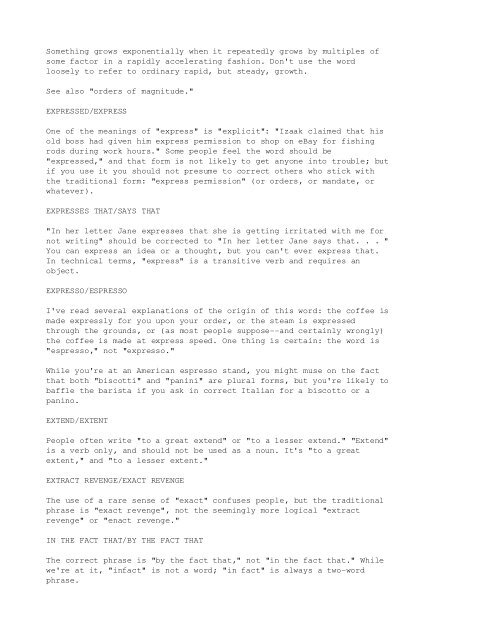Common_Errors_in_English_usage
Common_Errors_in_English_usage
Common_Errors_in_English_usage
You also want an ePaper? Increase the reach of your titles
YUMPU automatically turns print PDFs into web optimized ePapers that Google loves.
Someth<strong>in</strong>g grows exponentially when it repeatedly grows by multiples of<br />
some factor <strong>in</strong> a rapidly accelerat<strong>in</strong>g fashion. Don't use the word<br />
loosely to refer to ord<strong>in</strong>ary rapid, but steady, growth.<br />
See also "orders of magnitude."<br />
EXPRESSED/EXPRESS<br />
One of the mean<strong>in</strong>gs of "express" is "explicit": "Izaak claimed that his<br />
old boss had given him express permission to shop on eBay for fish<strong>in</strong>g<br />
rods dur<strong>in</strong>g work hours." Some people feel the word should be<br />
"expressed," and that form is not likely to get anyone <strong>in</strong>to trouble; but<br />
if you use it you should not presume to correct others who stick with<br />
the traditional form: "express permission" (or orders, or mandate, or<br />
whatever).<br />
EXPRESSES THAT/SAYS THAT<br />
"In her letter Jane expresses that she is gett<strong>in</strong>g irritated with me for<br />
not writ<strong>in</strong>g" should be corrected to "In her letter Jane says that. . . "<br />
You can express an idea or a thought, but you can't ever express that.<br />
In technical terms, "express" is a transitive verb and requires an<br />
object.<br />
EXPRESSO/ESPRESSO<br />
I've read several explanations of the orig<strong>in</strong> of this word: the coffee is<br />
made expressly for you upon your order, or the steam is expressed<br />
through the grounds, or (as most people supposeand certa<strong>in</strong>ly wrongly)<br />
the coffee is made at express speed. One th<strong>in</strong>g is certa<strong>in</strong>: the word is<br />
"espresso," not "expresso."<br />
While you're at an American espresso stand, you might muse on the fact<br />
that both "biscotti" and "pan<strong>in</strong>i" are plural forms, but you're likely to<br />
baffle the barista if you ask <strong>in</strong> correct Italian for a biscotto or a<br />
pan<strong>in</strong>o.<br />
EXTEND/EXTENT<br />
People often write "to a great extend" or "to a lesser extend." "Extend"<br />
is a verb only, and should not be used as a noun. It's "to a great<br />
extent," and "to a lesser extent."<br />
EXTRACT REVENGE/EXACT REVENGE<br />
The use of a rare sense of "exact" confuses people, but the traditional<br />
phrase is "exact revenge", not the seem<strong>in</strong>gly more logical "extract<br />
revenge" or "enact revenge."<br />
IN THE FACT THAT/BY THE FACT THAT<br />
The correct phrase is "by the fact that," not "<strong>in</strong> the fact that." While<br />
we're at it, "<strong>in</strong>fact" is not a word; "<strong>in</strong> fact" is always a twoword<br />
phrase.





